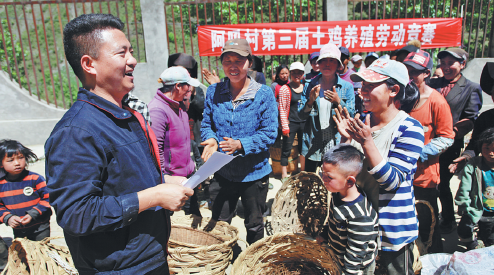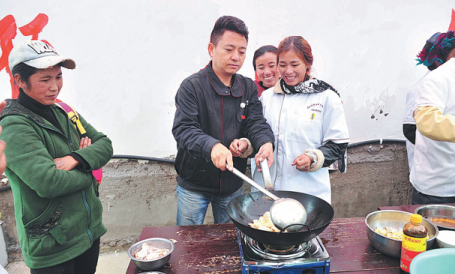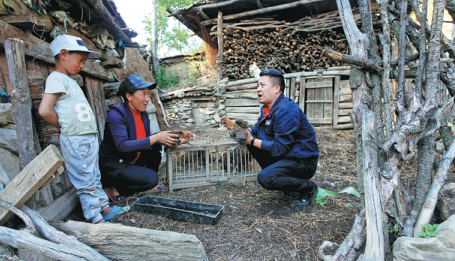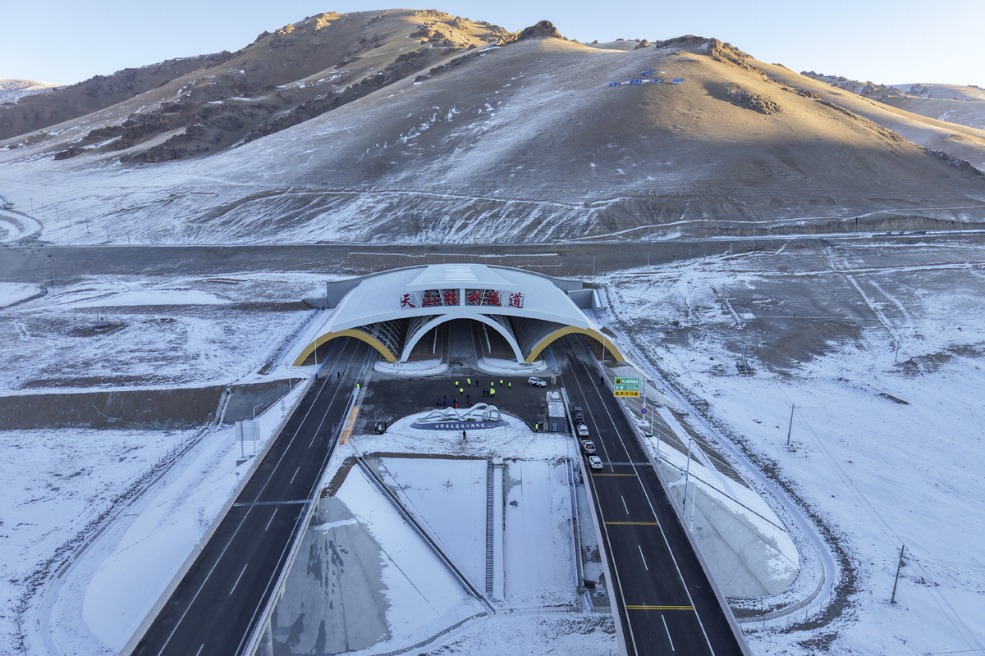An integrated approach
Deep in the mountains of Sichuan province, village cadre Wang Xiaobing has found a home in the hearts of the people he is helping with poverty alleviation, Fang Aiqing and Huang Zhiling report.

Village cadre on secondment, Wang Xiaobing, 46, has joined the efforts to help rural Ahou village of Southwest China's Sichuan province overcome absolute poverty and is building a solid economic foundation for villagers to pursue further development.
Despite the harsh natural environment, average annual income of the villagers has grown from 1,500 yuan ($228) in 2015 to 8,979 yuan in 2019. Wang says it's likely to exceed 10,000 yuan this year.
The province announced on Nov 17 that the last seven underdeveloped counties, including Xide where the village is located, have been lifted out of poverty, while the remainder of the country's 832 poverty-stricken counties-as recognized by the State Council in 2014-declared that, as of Monday, they, too, have shaken off their respective states of penury.
Wang could have returned to his original post two years ago at the end of his first tenure in Ahou, but he chose to stay.
"As the villagers moved forward to build a more plentiful life, I felt compelled to accompany them over the finish line, as they complete the last stage of their journey toward prosperity," he says.
When Wang, sent by the county branch of the State Grid, came to the village in Liangshan Yi autonomous prefecture at the end of 2016, all he could see was muddy paths, shabby houses and barren land.
A zigzag cement road connecting the village to Guangming town of Xide county was finished just a year earlier. When two cars passed each other, the passengers could easily reach out and touch the foliage that grew on either side of the road.
At the time, the nearly 1,000 villagers were scattered over a region of over 20 square kilometers on a mountain at an altitude of over 3,000 meters. They planted mainly potatoes for daily consumption and kept a few chickens to exchange for groceries.
In a very short time after arriving, Wang had visited every family to discover the needs of the villagers before embarking on a project to build a community with secure accommodation that benefited 73 impoverished families. Together, Wang and the villagers also managed to build a sewage treatment plant.
Locals usually plant some vegetables and fruits in their courtyard, and they can also pick up the fruit that grows on the ornamental cherry trees around the newly built community to eat or sell.
In the past, because of the poor transportation conditions, Boli Muga, 68, and his wife, struggled to sell the few potatoes and buckwheat they planted, or the chickens they kept.
Soon after, the couple moved into a new 80-square-meter house with three bedrooms and a flushing toilet. They paid 2,000 yuan, and the government subsidized them for the rest of the money.
Their daughter, the village's first college student, graduated this year and works as a nurse in Dechang county that has a better economy.
Upon learning that the couple had to borrow money for their daughter's college expenses, Wang and his team donated school fees and bought her a laptop.
Now Boli Muga works for the village administration to maintain the cleanliness of the village and public facilities. His wife is employed at the local agricultural base.
Wang also helps find sales channels and markets for the livestock kept by the villagers. Together, the couple is able to earn more than 20,000 yuan a year.
Wang is often called "uncle" by younger villagers. The word, while usually referring to a parent's male siblings, in Yi culture, is an appellation bestowed upon highly-respected male figures. Elderly people have also been entrusting their funeral arrangements to him.
Wang, an ethnic Yi himself, with his hair increasingly flecked with gray, gets tears in his eyes when recounting stories about how villagers have taken him in like a family member.
When infrastructure, like roads, power grids and pipe networks, internet access-and also a kindergarten-were built, Wang moved to start an agricultural base that grows traditional Chinese medical herbs like Fritillaria cirrhosa, Lilium pumilum and Prinsepia utilis to help grow a collective economy.
Because of the cold weather and infertile soil in Ahou village, it's inefficient to plant cash crops like peppercorns and walnuts which are commonly seen elsewhere in the prefecture.
Chen Yulin, who was sent by Sichuan's Deyang city in June 2018 to help with poverty alleviation work, was impressed by Wang's patience in explaining policies and economic plans to villagers.
Though not able to understand Yi language, he could tell Wang persuaded villagers to switch over to growing varieties suitable for local environment in an honest and detailed way.
Despite the disputes which sometimes happened during the process, they would reach a consensus and the villagers would correspond with him afterward.
Wang then invited experts to come and teach villagers the skills needed to work and improve income. He attended the lessons with them, so that he could help when villagers met difficulty in understanding the teachers.
As the herbs and sheep sold well, depending on their initial stake of either 200 or 300 yuan invested in 2017, for two consecutive years, the villagers received dividends ranging from around 1,800 to 3,000 yuan, Chen says.
Wang also encourages young villagers to learn how to manage an agricultural project, from the purchase of seeds and seedlings and their cultivation, to harvesting and sales.
Additionally, the village, which is surrounded by verdant hills, is set to build some sun houses and guesthouses to attract tourists from cities to come and experience a countryside lifestyle.
In doing all these things, Wang's major incentive is to guarantee that villagers are aware and capable of broadening the ways to improve their lives when the external help eventually leaves.
Getting to town is much more convenient nowadays, as almost every family has a motorcycle and villagers can also hail cars online.
Chen also found that young villagers have developed a growing interest in finding jobs in cities, either to improve income, open their mind, or seek better education opportunities for their children.
Wang and his team, who have put their hearts and souls into the village's development, have set up a system of values that are encouraged around the community, according to Chen.
On the mountain, with strong winds, television receivers are easily blown down. As it's hard to reach a maintenance man, villager Diri Luoqu learned to install and repair them. He has offered to do the work for free for more than 40 neighboring families this year alone.
As early as in 2005, Wang joined the project to build an electrical grid for the village. The rural village finally got switched on in 2007 thanks to the State-owned enterprise that invested 140 million yuan on the prefecture-level project to guarantee electricity access for rural people.
When Wang took over the job at the village in 2016, his wife was teaching at a village school away from home.
However, his sick mother, in her 70s, was determined to take care of their little children and managed to persuade her son to take on the challenge.
In 1964, she visited Beijing to perform at the Great Hall of the People on behalf of the prefecture and met Chairman Mao Zedong. She believes it's thanks to the Party that Liangshan people are able to have a better life.
Fifty-three years later, it was her son's turn to step into that same venerated hall and share his knowledge of poverty alleviation. He thinks it's the sense of responsibility that makes him stand out.
Having blended into the village, Wang holds the view that he's doing a job with the villagers on an equal footing, rather than directing a large group of people in a program.
With two months left of his second term, his mind is abuzz with tasks yet to be done, like transplanting herbs, helping villagers learn to keep bees and carrying forward the village's tourism resource development.




Today's Top News
- Militarism revival efforts criticized
- Leadership highlights Party conduct
- Forging a human-centered future in era of smart machines
- Land-sea trade corridor key to regional progress
- Local rules to be reviewed to help disabled
- Stronger RMB points to resilience






























